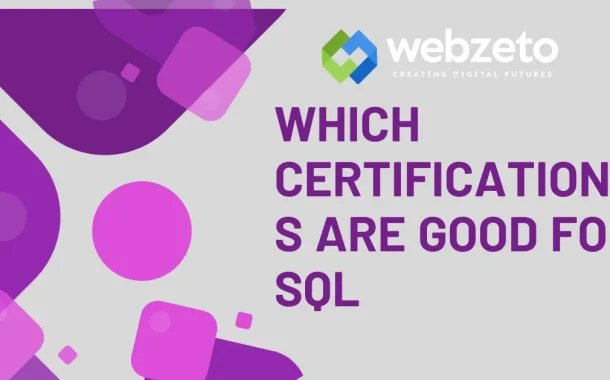SQL certifications are important in the IT industry because they show that you have the expertise needed to work with databases. Many companies look for certified professionals when hiring because it ensures that you have the right skills. Having an SQL certification can also help you get better job opportunities, higher salaries, and more credibility in your field.
Table of Contents
Table of Contents
Top SQL Certifications
1. Microsoft Certified Azure Data Fundamentals
This certification is ideal for beginners looking to work with data in the cloud, particularly within the Microsoft Azure ecosystem. It covers fundamental concepts such as relational and non-relational data, data warehousing, and basic data analytics using Azure tools. This certification serves as a strong foundation for those planning to advance into more specialized data roles or pursue higher-level Azure certifications.
2. Oracle Database SQL Certified Associate
Oracle’s certification is widely recognized and focuses on SQL fundamentals within the Oracle Database environment. It covers essential skills such as writing queries, managing data, and understanding database objects like tables, views, and indexes. This certification is perfect for those who want to build a solid foundation in Oracle SQL, whether they are new to databases or aiming to specialize in Oracle technologies.
3. IBM Certified Database Associate
This certification is geared towards individuals who want to demonstrate their skills in IBM’s Db2 database. It covers SQL basics, core database concepts, and specific functionalities of Db2, such as database security and backup strategies. It’s an excellent choice for those interested in working with IBM’s database solutions in enterprise environments, where Db2 is commonly used.
4. PostgreSQL Associate Certification
PostgreSQL is a leading open-source database, and this certification validates your ability to use SQL effectively within the PostgreSQL environment. It covers topics like database setup, data querying, and performance tuning. This certification is well-suited for professionals who prefer working with open-source technologies and want to demonstrate their expertise in a versatile and widely adopted database system.
Entry-Level SQL Certifications
1. Microsoft Technology Associate (MTA)
This certification is designed for individuals new to SQL and databases. It covers the basics of database design, SQL queries, and data manipulation. The MTA Database Fundamentals certification is an excellent starting point for those who want to understand how databases work and how to interact with them using SQL. It’s especially useful for those considering a career in database administration or development within the Microsoft ecosystem.
2. Oracle SQL Certified Associate
The Oracle SQL Certified Associate certification is tailored for beginners who want to start their journey in SQL with Oracle databases. It covers essential SQL topics, including writing basic queries, creating and managing database objects, and controlling user access. This certification is ideal for those who want to gain a strong foundation in SQL while working with one of the industry’s most widely-used database systems. It’s a good stepping stone for more advanced Oracle certifications.
3. IBM Certified Database Associate Db2 Fundamentals
This entry-level certification is perfect for those looking to start with IBM’s Db2 database. It covers the basics of SQL, database design, and Db2 operations. The certification is aimed at beginners who want to learn about relational databases and how to use SQL within the Db2 environment. It’s a great choice for those looking to build a career in database management, particularly in organizations that use IBM’s Db2.
4. SQL for Data Science
Although not a traditional certification, this course and certification offered through Coursera by the University of California, Davis, is highly regarded for beginners. It introduces SQL in the context of data science, covering basic querying, data manipulation, and working with real-world datasets. This is ideal for individuals looking to apply SQL skills specifically in data science roles.
5. Google Data Analytics Professional Certificate
This certification is part of Google’s Data Analytics Professional program on Coursera and includes a strong foundation in SQL. It covers basic SQL querying and data manipulation within the broader context of data analysis. It’s an excellent entry point for those looking to break into data analytics, providing both SQL knowledge and a broader understanding of data handling.
Advanced SQL Certifications
1. Microsoft Certified: Azure Database Administrator Associate
This advanced certification is for individuals who already have experience with SQL and want to specialize in managing databases on Microsoft Azure. It covers advanced topics like performance tuning, backup and recovery strategies, high availability, and security in cloud-based SQL environments. This certification is ideal for those who want to take on roles like database administrator or database engineer, particularly in organizations using Azure.
2. Oracle Certified Professional: Oracle Database Administrator
The Oracle Certified Professional (OCP) certification is designed for those who have a strong foundation in SQL and Oracle databases. It covers advanced database management tasks such as backup and recovery, performance tuning, database security, and automation of routine tasks. This certification is highly respected and is a must for professionals aiming to work as senior Oracle database administrators or architects in large enterprises.
3. IBM Certified Advanced Database Administrator – Db2
This certification is aimed at experienced database professionals who want to master IBM’s Db2 database system. It covers complex topics like advanced database administration, performance tuning, disaster recovery, and database optimization. This certification is ideal for those who have already achieved the associate level and are looking to advance to senior positions in organizations that use Db2.
4. PostgreSQL Certified Professional (PGCP)
The PostgreSQL Certified Professional (PGCP) certification is for those who have a strong command of SQL and want to specialize in the PostgreSQL environment. It includes advanced topics such as performance tuning, replication, database architecture, and security. This certification is perfect for professionals who work with open-source databases and want to validate their expertise at a higher level, particularly in roles that require managing large and complex PostgreSQL deployments.
5. Microsoft Certified: Data Analyst Associate
While this certification primarily focuses on data analysis, it includes advanced SQL skills necessary for querying and analyzing complex datasets. It covers topics like data transformation, data modeling, and using SQL for advanced analytics in tools like Power BI and can be a strong foundation for those looking into Power BI consulting.
How to Prepare for SQL Certification Exams
Preparing for SQL certification exams requires a focused approach to ensure you master the necessary concepts and skills.
- Understand the Exam Objectives: Begin by reviewing the official exam objectives or syllabus provided by the certification body. This will give you a clear understanding of the topics you need to study, such as SQL queries, database design, performance tuning, or security. Knowing what to expect helps you focus your study efforts on the most relevant areas.
- Use Official Study Materials: Invest in official study guides, online courses, and practice exams offered by the certification provider. These resources are tailored to the exam content and often include sample questions, detailed explanations, and practical exercises. For example, Microsoft, Oracle, and IBM provide extensive documentation, training courses, and practice tests that align closely with their certification exams.
- Practice Hands-On SQL: SQL is a practical skill, so hands-on experience is crucial. Set up a test environment using database management systems like MySQL, PostgreSQL, Oracle, or SQL Server, depending on your certification. Practice writing queries, creating and managing database objects, and performing tasks like data manipulation, indexing, and optimization. The more you practice, the more comfortable you’ll become with real-world SQL scenarios.
- Take Practice Exams: Practice exams are essential to gauge your readiness. They help you familiarize yourself with the exam format and timing while identifying areas where you need more study. Use practice exams to simulate the actual test environment, and review your answers to understand any mistakes. This will boost your confidence and improve your performance on the actual exam day.
- Join Study Groups or Forums: Engage with others preparing for the same certification by joining study groups, online forums, or social media communities. These platforms allow you to discuss difficult topics, share study tips, and learn from the experiences of others. It’s also a great way to stay motivated and keep track of your progress.
- Review and Revise: In the days leading up to the exam, focus on reviewing your notes, revisiting challenging topics, and refining your knowledge. Make sure you’re comfortable with all key concepts and have practiced enough to apply your SQL skills confidently.
FAQs
Q1. Do SQL certifications expire?
Yes, some SQL certifications have expiration dates. For example, certifications from Microsoft or Oracle may need to be renewed every few years. It’s important to check the specific certification’s guidelines to know when you need to renew it.
Q2. Can I get a job with just an SQL certification?
An SQL certification can improve your chances of getting a job, especially in entry-level positions. However, employers also look for practical experience and other skills. Combining an SQL certification with hands-on experience will make you more attractive to employers.
Q3. How long does it take to prepare for an SQL certification?
The time it takes to prepare for an SQL certification varies. It depends on your current knowledge and the complexity of the certification. On average, it may take a few weeks to several months of study and practice to be fully prepared.
Q4. Are online SQL certifications recognized by employers?
Yes, many online SQL certifications are recognized by employers, especially those from well-known organizations like Microsoft, Oracle, or Coursera. It’s important to choose certifications from reputable sources to ensure they are valued in the job market.
Q5. Do I need programming knowledge to get an SQL certification?
Basic programming knowledge can be helpful but is not always required for entry-level SQL certifications. Most certifications start with fundamental SQL concepts, so you can learn as you go. Advanced certifications may require some programming skills.
Conclusion
Choosing the right SQL certification depends on your career goals and experience level. Whether you are just starting or looking to advance your skills, there is a certification that can help you grow. Entry-level certifications are great for building a foundation in SQL, while advanced certifications can help you specialize and take on more complex roles.
Earning an SQL certification can open up new job opportunities, increase your earning potential, and give you an edge in the competitive job market. It shows employers that you have the skills to work with databases effectively.














